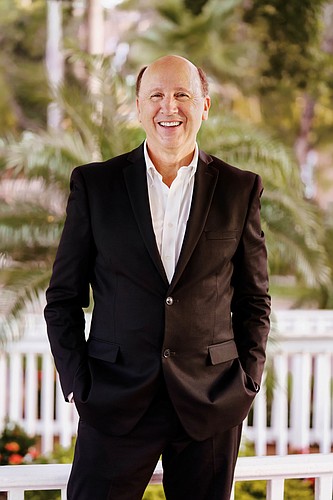- December 25, 2024
-
-
Loading

Loading

Less than a year into what was a dream CEO job, Mark Pritchett got walloped with a nightmare: He was micromanaging the organization, the Gulf Coast Community Foundation, and stumbling as the leader of what was then a 18-employee, $281 million-asset organization.
Pritchett was named CEO of the prominent Venice-based nonprofit, which handles $500 million in charitable funds for 950 families, individuals, businesses and organizations, in September 2015. The GCCF was created in 1995 through the sale of the Venice Hospital. By 2021 its assets had grown to $357.47 million, and it had 27 employees.
Pritchett had been vice president of community investment at the foundation from 2008 to 2015. When he got promoted to CEO, replacing Teri Hansen, who had moved on to take the helm of another local foundation, Pritchett thought he would be a tinkering kind of leader. An admitted policy wonk, he set out to learn a little bit about what everyone at the foundation did and then fidget with their role, making the organization, and the employee, better.
Then reality sucker-punched Pritchett.
A series of employee surveys and some frank conversations with other employees revealed Pritchett was over-involved in day-to-day processes. He was buried too much in what individuals were doing, and not letting them do their job.
“It was an eye-opening experience,” says Pritchett, 68. “I thought I was just walking around learning about their jobs but it turned out what I was really doing was micromanaging their jobs. I thought what I was doing was the right thing but I wasn’t.”
Pritchett, through the help of some close friends, including one going back to third-grade in Paducah, Kentucky, significantly changed his leadership style and approach. Seven years later, now as one of the region’s most influential nonprofit leaders, Pritchett has announced his retirement. He plans to retire in 2023, and will be part of a search committee to help find his replacement.
Like many team-first leaders, Pritchett, when he and I have spoken in the past, often deflected credit to foundation employees or others in the community for the organization’s success. But in an interview after his retirement announcement, Pritchett was candid and self-reflective about his leadership experience — including his trip out of micromanager land.
After Pritchett received those employee surveys, he says he was both stunned and hurt. Asked how he dealt with it, and how he had the humility to change, he chuckles and says “it took a lot of humility and it was humiliating,” emphasizing the latter.
Pritchett consulted with Dave Mason, a former executive with Motorola who later took a leadership post at the foundation. Pritchett also leaned on advice from his best friend, Craig Watts. The pair had been tight since they were eight years old in Kentucky. Watts held executive roles in business for more than 30 years, including helping take a furniture manufacturing company public.
Those conversations, while not a lightning-quick leadership epiphany, set up Pritchett for success. It also took a daily effort, says Pritchett, to hold back and not…tinker. The transition, and lesson learned, was weighty.
“Your job is to be there and help create an environment of success,” Pritchett says. “If you do that, you will grow a great team and build a great organization. And knowing you are helping your people be the best they could be is a great calling in life.”
“It was very freeing,” he adds. “There are a lot of leaders who don’t see their blind spots and don’t address them, and that can really hurt the (organization’s) culture. I became a better leader when I realized I had some blind spots.”
Pritchett cites his working relationship with foundation Senior Vice President for Community Leadership Jon Thaxton as a good example of how he saw — and adjusted — his blind spot. Thaxton joined the foundation in 2012, after serving three terms as an elected Sarasota County commissioner. When Pritchett was named CEO, Thaxton was promoted to what was basically Pritchett’s previous role.
Pritchett says he and Thaxton butted heads a bit early on. “I was a data geek, and I tried to make Jon into the person I was,” Pritchett says. “I was frustrated at John, he was frustrated with me and I was frustrated with myself.”
Stepping back and heeding the advice of his peers led Pritchett to let Thaxton be himself. Now Thaxton, much like Pritchett was in past jobs, is a go-to voice in the community on several issues, including the environment and affordable housing.
Some of Pritchett’s leadership mindset stems from his work ethic, which goes back to when he was a 14-year-old paperboy. Since then he’s done everything from being a cook and restaurant manager to a steel mill worker to a tutor, researcher and lobbyist.
Some of his other key career leadership lessons include: